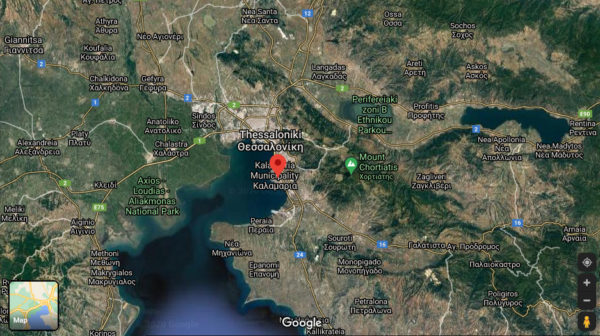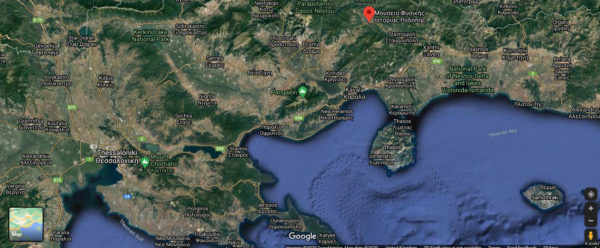People beaten nearly to death by the Greek police during a mass pushback across Evros/Meric river
| 07.05.2020 | Meriç river, near Meric/Ipsala, Turkey | Anonymous Partner | 41.2826175, 26.4614314 | Greece | Turkey | yes | no | yes | yes | no | no | 16 - 40 | 120 | Afghanistan, Pakistan, Morocco, Algeria | detention, fingerprints taken, photos taken, personal information taken, papers signed, no translator present, denial of access to toilets, denial of food/water | 100+ | beating (with batons/hands/other), kicking, pushing people to the ground, insulting, theft of personal belongings | Greek policemen in black uniforms and balaclavas, Greek army |
It was in the last days of March 2020 the interviewee, a 33 year old man from Morocco, was in Kamara, central Thessaloniki, chatting with a group of friends (who were all Greek citizens). He had been in Greece for a long time, so he spoke Greek and had local friends. On the day in question, six Greek policemen in plain clothes arrived in grey unmarked cars. They approached the group, introduced themselves as the police, and asked the respondent to show them his documents. He showed them his valid registration card (“Ausweis”). They asked him to come with them to a police station in order to check his documents. He was told he would be released shortly, so he followed them to the car. He was taken to a police station in Kalamaria, a town about 7 kilometers south of Thessaloniki.
[caption id="attachment_15797" align="alignnone" width="600"] Location where the respondent was taken.[/caption]
At the Kalamaria police station, the interviewee’s documents were checked and his body was searched. Then the policemen brought some documents for him to sign. The documents were written in Greek and there was no interpreter present. The interviewee can only speak Greek, but not read or write it, so he did not know what he was signing. He was convinced by the policemen that these were release papers and a part of a regular procedure, so he signed them. After that, his fingerprints and face photographs were taken. He was not given any food or water, and did not have access to toilets during custody.
Around 03:00-04:00 in the night, the interviewee was taken from his cell by 2 policemen in plain clothes and brought to the Police Headquarters (“Megalo”) in Thessaloniki by car. The journey lasted about an hour. In “Megalo”, there were 20 other people-on-the-move, Algerians and Moroccans, who had also been taken from the street like the respondent. There were three minors among them and the others were in their mid-20s. All of them had legal documents to stay in Greece, which were confiscated by the police. The interviewee was detained there for 5 days. All 20 people were together in one cell. The conditions were quite bad, he shared, and the police were often violent against the people. There were good and bad officers, he stated. Some of the detainees were upset and demanded an explanation of why they were kept there. They were shouting, so the “good” policeman called the “violent ones,” who beat them.
After 5 days, officers came in the morning and took all 20 people from the cell, and handcuffed them. The people asked where they were being taken, but they did not receive a clear reply. The officers put the people in a large police bus and left. The bus stopped on the way and more people were loaded inside - Arabs, Pakistani, Bangladeshi, and Afghanis - until the bus was full, carrying around 60 people. Then they were taken to the Drama Paranesti Pre-removal Detention Centre. Their documents issued by the Greek state were never returned to them, and the cameras on everyone’s mobile phones were broken in order to prevent documentation. The respondent was detained at the Drama detention center for 3 months. At the time of interview he was still in contact with friends who had been there for 6 months plus.
[caption id="attachment_15798" align="alignnone" width="600"]
Location where the respondent was taken.[/caption]
At the Kalamaria police station, the interviewee’s documents were checked and his body was searched. Then the policemen brought some documents for him to sign. The documents were written in Greek and there was no interpreter present. The interviewee can only speak Greek, but not read or write it, so he did not know what he was signing. He was convinced by the policemen that these were release papers and a part of a regular procedure, so he signed them. After that, his fingerprints and face photographs were taken. He was not given any food or water, and did not have access to toilets during custody.
Around 03:00-04:00 in the night, the interviewee was taken from his cell by 2 policemen in plain clothes and brought to the Police Headquarters (“Megalo”) in Thessaloniki by car. The journey lasted about an hour. In “Megalo”, there were 20 other people-on-the-move, Algerians and Moroccans, who had also been taken from the street like the respondent. There were three minors among them and the others were in their mid-20s. All of them had legal documents to stay in Greece, which were confiscated by the police. The interviewee was detained there for 5 days. All 20 people were together in one cell. The conditions were quite bad, he shared, and the police were often violent against the people. There were good and bad officers, he stated. Some of the detainees were upset and demanded an explanation of why they were kept there. They were shouting, so the “good” policeman called the “violent ones,” who beat them.
After 5 days, officers came in the morning and took all 20 people from the cell, and handcuffed them. The people asked where they were being taken, but they did not receive a clear reply. The officers put the people in a large police bus and left. The bus stopped on the way and more people were loaded inside - Arabs, Pakistani, Bangladeshi, and Afghanis - until the bus was full, carrying around 60 people. Then they were taken to the Drama Paranesti Pre-removal Detention Centre. Their documents issued by the Greek state were never returned to them, and the cameras on everyone’s mobile phones were broken in order to prevent documentation. The respondent was detained at the Drama detention center for 3 months. At the time of interview he was still in contact with friends who had been there for 6 months plus.
[caption id="attachment_15798" align="alignnone" width="600"] Detention centre where the respondent was held for three months.[/caption]
Upon arrival, the newcomers were put in cells in groups of 10-15 persons. The detainees were always hungry, as they were being given very little food and the food was bad, unhealthy, and made them feel sick.
Detention centre where the respondent was held for three months.[/caption]
Upon arrival, the newcomers were put in cells in groups of 10-15 persons. The detainees were always hungry, as they were being given very little food and the food was bad, unhealthy, and made them feel sick.
“They were only feeding us enough to survive,”Moreover, the detainees were not given any clothes, and were constantly subjected to insults and physical violence. When a person asked questions such as why was he kept there, complained, or asked for basic necessities such as underwear, often an argument broke out. In these cases, the guards called the officers covered with balaclavas, who beat everyone from that cell. The beatings were brutal. The respondent was beaten many times in all kinds of ways - punched, hit with batons, kicked, stamped, etc. Some people’s heads and cheeks were injured in the beatings, but the police did not care, stated the respondent.
“They hit you in your face, in your head, your back, it’s up to them.”The respondent's back was injured and at the time of interview, months later, he still had swelling on his upper arm from a beating in Drama. The injury occurred when he was being beaten and an officer attempted to hit his head with a baton, but he protected himself with his arms. In addition to physical violence and deprivation from basic necessities, the detainees were also constantly subjected to insults. They were called words that our translator was unable to state out loud because of their level of abuse. After 3 months at the Drama detention center, on approximately 5 July 2020, the respondent was pushed-back to Turkey, together with around 120 other people. According to to the respondent, they were some of the first people to be a part of the mass pushbacks from inland detention centers in Greece that he knew of. At 15:00 one day, the detainees were loaded into two large police busses, carrying about 60 people per bus. They were told that they would be taken to Amygdaleza Pre Removal Detention Facility in Athens, but they were taken to the Evros/Meriç river on the Greek-Turkish border. The bus journey lasted about 4-5 hours, so it was dark when they arrived at the border. There were several pushback points at the riverside. The bus stopped every half an hour or so and unloading people in groups of 10-15 people. When the group with the respondent got off the bus, involving about 10 people, including 16-17 years-old minors, there were about 50-60 Greek police officers and soldiers present at the riverside, some wearing plain clothes and some in uniforms. What followed was the worst treatment the respondent said he had ever experienced. The officers confiscated people’s phones, shouted at them to shut up, telling them to go back to their countries, and brutally beat them. The officers forcefully held people’s heads and cut their hair. They gathered everyone together, ordered them to sit down and face the ground with their hands behind their heads, and started hitting them with large metal batons. Both minors and adults were attacked in this way for about 1 hour according to the respondent. Some people’s arms, legs, and heads were severely injured. The interviewee’s ribs were broken and his leg was badly injured. Two persons from the group were beaten incredibly badly and they were unable to move, apparently unconscious. At about 22:00/23:00, the people were loaded into a dinghy and taken over the Evros river by two police officers wearing balaclavas. When they arrived at the other side of the border, they carried the two unconscious persons out of the boat. They were afraid of the Turkish soldiers, so they had to move on and abandon them. They thought they might have died, but later learned that they had been taken to a hospital by Turkish soldiers, where they had to be treated for 26 days in order to recover. The group of 8 walked for about 40 minutes, until they reached a village near Meriç, Turkey. Due to the covid lockdown, there was nobody around to help them. They had no clothes, mobile phones, or money, so they had no choice but to walk to the town of Edirne. But even there they could not find any help and could not get any food. The interviewee’s injuries healed eventually, despite having no access to medical assistance. He returned to Thessaloniki after his recovery.
